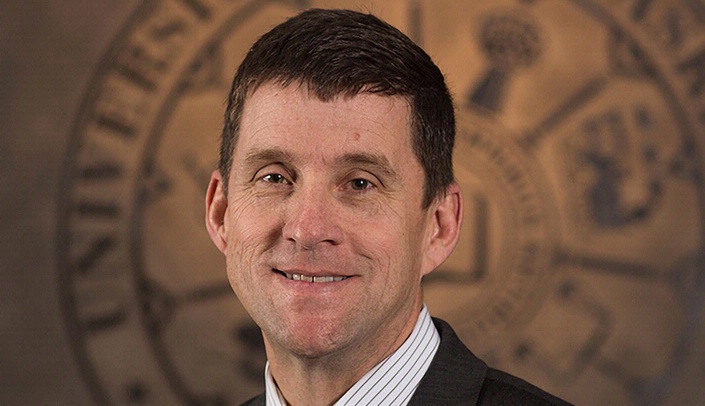The University of Nebraska Thursday released a proposed policy that underscores NU’s long-standing commitment to freedom of expression across its campuses.
The proposed policy, which will go before the Board of Regents at its Jan. 25 meeting, continues years of work by the university to advance issues related to inclusion, civil discourse and the free exchange of ideas.
It was developed by a university-wide working group appointed by President Hank Bounds, Ph.D., that comprised student affairs, facilities and legal staff, among others. It was also informed by significant feedback from faculty, staff and student leadership, along with insights from an October gathering of U.S. higher education leaders at the University of Chicago attended by NU Executive Vice President and Provost Susan Fritz, Ph.D.
Board of Regents Chairman Bob Whitehouse, who, together with Vice Chairman Rob Schafer, will bring the policy to the full board for consideration, noted that the proposal supplements existing board policy that articulates the university’s commitment to free expression for all members of the academic community, starting with its 53,000 students and talented faculty and staff.
The proposed policy is intended to clarify and reinforce that commitment.
“The constitutional right to free speech is at the core of the mission of the University of Nebraska, where our ability to create and share knowledge depends on the robust, open exchange of ideas,” Whitehouse said. “At a time when we’re part of a national conversation about these issues, it’s important for us to re-examine and recommit ourselves to the principles that any institution of higher learning must hold dear. I’m pleased with the work that’s been done and I especially thank our faculty senate presidents, staff leadership and student regents for engaging their peers and providing thoughtful feedback throughout this process.”
Schafer, who will assume chairmanship of the board on Jan. 25, said: “Nebraskans expect and deserve a university where every student and all members of our community are welcomed and encouraged to participate in open, respectful dialogue. As institutions across the country have found, these issues can be challenging. But I’m convinced Nebraska can lead the way in finding a path forward. I commend the president and chancellors for being proactive in creating solutions, along with the many individuals across our campuses who spent considerable time offering input and developing a policy Nebraskans can be proud of.”
Dr. Bounds praised the four NU faculty senate presidents and other colleagues for their work in developing the proposed policy, noting it would not have been possible without broad input from faculty and others who engage with students every day.
“Being the best place in the nation to be a student means that we provide a learning environment where every student feels welcome to take part in the kind of free, vigorous, respectful dialogue and debate that will make them better thinkers and learners by the time they graduate. This policy would move our goal forward,” Bounds said.
The proposed policy does three things:
- Reinforces the commitment of the Board of Regents and University of Nebraska to the tenants of free expression.
- Directs each campus to implement and communicate facilities use plans that — consistent with the law, university policy and each campus’ unique mission — designate which facilities, properties and other resources are “designated public forums” (such as a sidewalk), which are “limited public forums” (such as a concert hall), and which are “non-public forums” (such as a classroom).
- Mandates that the university provide regular opportunities for education about the First Amendment and relevant policies.
If the policy is adopted, university leadership will be required to report to the board in early 2019 on progress on campus facilities use plans, any complaints of alleged violations of the policy and subsequent actions taken, and educational opportunities that were provided related to the First Amendment.
Once adopted, each campus will continue the process to approve a policy that identifies “designated public use” spaces, such as malls, a plaza or sidewalk, that are for uses outlined in the policy. Other areas will be available for “limited public forum areas or facilities,” such as large auditoriums; and for “non-public areas or facilities,” such as classrooms, research labs or administrative offices.
Officials expect that each campus will have these guidelines/policy in place during the spring semester.
“This is important in our state and on our University of Nebraska campuses,” said Jeffrey P. Gold, M.D., chancellor of UNMC and the University of Nebraska at Omaha. “UNMC and UNO continue to work to ensure that all students feel secure in their First Amendment right to free expression on campus.”
